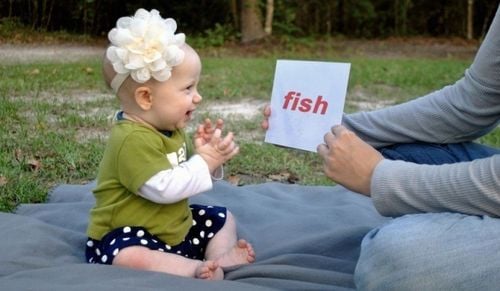This is an automatically translated article.
Not only helps children develop cognition and build neural connections in the brain, books also stimulate children to develop language and intelligence to the best. So what books do children like to read and what kinds of books should children read?1. What books do children like to read?
A new study by researchers at Vanderbilt University, Nashville and the University of Texas, Austin finds that young children seem to prefer books that satisfy a natural need more than books that have to understand how operating world. Books often have causal information that describes things like:
Why a character in a book chooses a certain action or a certain way, Why an event happens What should be done to make something work For example For example, a good explanatory book just tells you why tigers have stripes. It further explains that stripes make the tiger harder to see in the grass, so it can better surprise its prey.
The researchers, who published their findings in the journal Frontiers in Psychology recruited 50 families in Austin, Texas, with children 3 and 4 years old. In two discussions a few weeks apart, volunteers read the same pair of books to each child: Loudest, Strongest, Fastest, and What do you do when something tries to attack you? by author and illustrator Steve Jenkins.
Both books are about animals, but Biggest, Strongest, Fastest simply describe each animal, while What Do You Do When Something Wants to Attack You? explain how a certain body part or behavior of an animal helps it to survive. (The researchers edited the books for the test to make this distinction clearer and to have each book the same number of words.)
During each reading session, the volunteers used the same number of words. a way of reading with children and reading the same books, but in a different order. At the end of the hour the children were asked which book they liked more, the results showed that nearly 44% of the children chose this explanatory book as their favorite story, compared with 29% choosing the Biggest, Strongest book. , The fastest.
Study co-author Margaret Shavlik told CNN that finding cause and effect could release the pleasure chemical dopamine in children's brains. When parents choose books that help children do this, it can encourage children to enjoy reading and strengthen their children's early literacy skills.
This study was quite small and involved only two books, so it cannot be taken as solid evidence that children are more interested in reading books that explain why and how things work. However, it is consistent with what scientists know about the curious nature of young children. That is why children often ask and ask about everything around with interest.
Even if the book you're reading with your child doesn't do this, you can help engage your child by asking questions as you read together and getting him to find items on the page.

Những cuốn sách nói về thiên nhiên luôn thu hút sự chú ý của trẻ
2. How to help children love reading
To form a habit of reading books, loving books is not an easy job. If habits are formed for children from an early age, it will determine their ability to read for a long time later.
Create excitement for children when approaching books: Choose eye-catching books to help children's curiosity create the attention of young children. Besides, you need to choose for your children books printed with good quality, printed by reputable publishers. Think of books as a close friend: To help your child get more excited, parents can play with their children a jigsaw puzzle with books every day. Children can play with books all day without getting bored. At home, give your child a separate bookshelf or place books in places closest to them where they can easily get them. A bookcase can be placed in the child's bedroom. Thus, children can see books every day and parents can read books anytime and anywhere if they like. When you go to the bookstore, suggest to your child how to choose books instead of buying books according to their own preferences. Plus, give your child the excitement of thinking that this is a book of their own choosing and taking full responsibility for this action. You can also whisper to the counselor in the bookstore to advise your child about the book. Through these actions will help you understand what books children like to read? Be a role model for reading to your child: Parents are the mirror and children are the mirror image of their parents. Children love to imitate and that is why you need to love reading if you want them to do this. When they see you reading, children will find out for themselves what their parents are doing so passionately and attentively. Explain to your child that you are playing a very interesting game and ask him if he would like to play along. Read books with your child often and read to them. However, to form the habit of reading to children from the very beginning of life, you should only read short stories. This will help children feel less bored. Interact with your child about books: Talk to your child often about what they read when they are at the stage where they can read a paragraph or a book. You can ask your child simple questions and when he has answered them he will feel like he has achieved success. Besides, these questions also help children develop brain, develop language and expression. Turn books into funny stories: Make books more fun, more witty, and easier to get into your child's mind because children can't imagine how important reading is. By interacting with children with characters they like, make books relevant to everyday life. You can illustrate with stuffed animals in your home or you simply transform into a character in a book when reading to your child, children will actively find good points in the book when they feel interested in the books. that character.

Cha mẹ nên là người dẫn dắt và cùng con tìm hiểu kiến thức trong sách
In this case, you can ask for the advice of experts and doctors at Vinmec International General Hospital to discuss and advise more carefully on how to raise children according to each age.
With enthusiasm and high professional qualifications, the doctors here will always bring customers good services with the highest quality of service.
Please dial HOTLINE for more information or register for an appointment HERE. Download MyVinmec app to make appointments faster and to manage your bookings easily.
Reference source: babycenter.com













